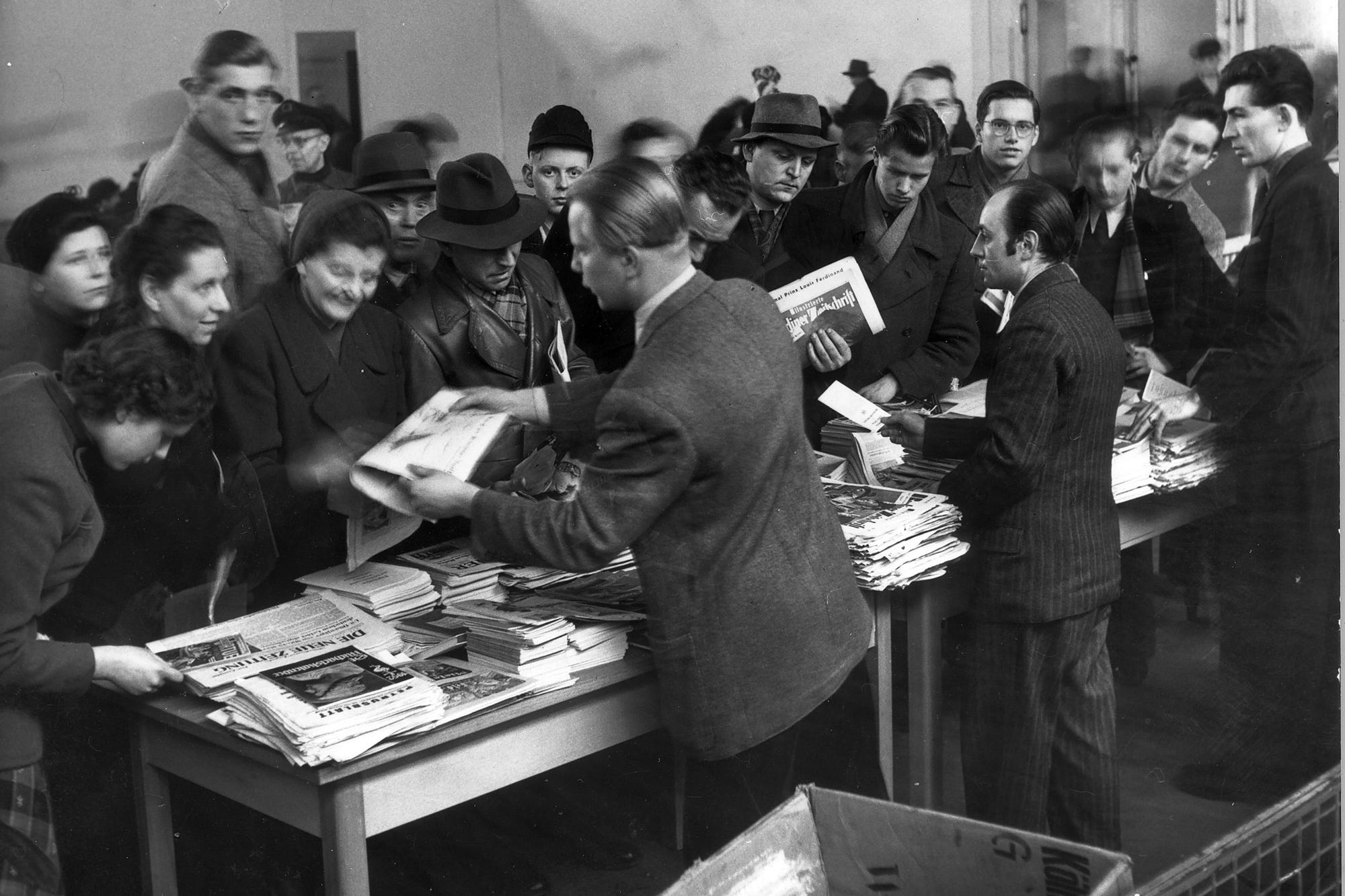The New York Intellectuals were a hallowed group of writers and critics who were convinced of the power and art of disputation. Writer and journalist Tomiwa Owolade, whose perspicacious 2023 book This is Not America would have undoubtedly resonated with the mid-twentieth-century NY Intellectuals, explains why he grew up besotted with the group’s writing. I myself then follow Owolade with my interpretation of the esteemed group through a critical review of a new book on their writing.
We then focus on a very different group of intellectuals—scholars in Russia—who Dmitry Dubrovsky argues are in a state of zugzwang, in which every possible action they endeavor to take results in negative consequences. Dubrovsky’s is a sad and distressing tale.
Our curated content this issue begins with the Munich Security Conference, and features Tom Meaney‘s analytical send-up of this annual gathering. Few equal Meaney’s ability to sustain a romp this convincingly over 8000 words.
David Ownby then provides a terrific overview of the rise and fall (and re-rise) of the Chinese New Left. Ownby gracefully takes us through a complicated set of intellectual relationships these last thirty years in the PRC.
We follow with a fine review essay by Daniel Schillinger, in The Point, that looks at the naturalization of digital technology. Has it all started to reign as common sense and are we entrapped in it forever more?
We then conclude with the critic Farah Abdesammad, who takes us on a very personal tour d’horizon of postcolonial life of North Africans in France.
Our musical selection this week is from Kevin Ayers, one of the progenitors of the late 1960s/ early 1970s Canterbury group of progressive musicians in the UK. This infectious track comes from Ayers’ 1973 record Bananamour.
—Leonard Benardo, senior vice president at the Open Society Foundations
My New York Intellectuals

Tomiwa Owolade
The Ideas Letter
Essay
Owolade, a young British-Nigerian author, is not Jewish, from New York nor of the 20th Century. Yet he feels a deep kinship with the New York Intellectuals, due to their universalist spirit and commitment to culture beyond identity. He admires their belief in valuing art and literature for its inherent worth, independent of political or personal identity, which resonates with his own approach to culture and intellectual pursuit.
“To expect writers from marginalized backgrounds to be ideologically opposed to white, male writers is wrong as a matter of fact and wrong in principle. It undermines the actual relationship that exists between many writers from marginalized backgrounds and authors from other backgrounds and from the past. It undermines what literature should be for in the first place: emphasizing our universal humanity, not putting us into competing silos.”
The Tough Guy Crew
Leonard Benardo
The New Statesman
Essay
Benardo lambasts the central conceit of Ronnie Grinberg’s book, Write Like a Man: Jewish Masculinity and the New York Intellectuals, that the work of the New York Intellectuals reflected a “secular Jewish masculinity,” and that this could be conceived as an ideology, or even “a coherent perspective.” For Benardo, the intellectual fervor and varied political commitments of New York Intellectuals cannot be adequately explained by such a reductionist framework. Indeed, Jewishness was hardly primary for many of these writers, tied by their “adherence to ardent writing and the fructifying convergences in politics and culture.”
“Saddled with a shaky definition of what masculine means and asserting that brilliant women writers sought to enact a “masculine” sensibility amid “hypermasculinised intellectual warfare,” we are left with an unsatisfying theory of the case. Instead of conceptual clarity we get analysis by anecdote. Grinberg seeks to locate the New York Intellectuals’ voracious hunger for argument and critique as a sign of a new-world masculinity that would transcend the people-of-the-book stereotype and assign a newly conceived machismo to the art of disputation. She further suggests, bafflingly, that New York Intellectual writers such as Susan Sontag and Elizabeth Hardwick weren’t card-carrying feminists because, well, they wrote like men and their oeuvre wasn’t peppered with writings on the subject of women. The only way for a woman within the New York Intellectual crowd to pass muster with her peers was, per her own title, to write like a man. Can this really be so? Can one meaningfully place a gendered valence on the craft of writing?”
Russian Scholars
Facing Zugzwang

Dmitry Dubrovsky
The Ideas Letter
Essay
Russian scientists are in a state of akin to zugzwang in chess, where every possible action they take results in negative consequences. Those who stay in Russia face repression, ideological constraints, and a militarized educational environment, while those who leave struggle with the stigma of being from an aggressor state, leading to a sense of hopelessness and forced silence both at home and abroad.
“The result of this zugzwang is forced silence. In Russia, it’s the asphyxiation of the public intellectual—when people are silent not only out of fear but because of the disappearance of public space. Abroad, it’s more like aphonia, where speaking about the problems of Russian scholars and Russian education in exile can only be done in whispers, as Ukraine’s tragedies loom large.”
Masters of War
Thomas Meaney
Harpers
Essay
Meaney recounts this year’s Munich Security Conference, which took place in a grim geopolitical context of ongoing war in Ukraine, Vernichtungskrieg (war of extermination) in Gaza, coups and insurgencies in the Sahel, and hard right insurgencies in Europe: “Lost on the managers and technicians at Munich was that security is not the same thing as peace.”
“One could be forgiven for thinking that the golden age of the Atlanticists was the Nineties, when American power still seemed supreme, when China was just becoming an oil importer, Indian internet connections were patchy, and Russian children drank vodka on Nevsky Prospekt in the chaos of post-Communism. But the real golden age was the early Sixties, when American power was not merely maintained but in ascendance, when wide domestic opposition to wars of choice abroad had only just made itself felt. When there was an enemy to be faced down across the Iron Curtain that organized moral life. When the old Nazi-built Tempelhof Airport in Berlin included a U.S. air base with a bowling alley and a basketball court. For Atlanticists, most of them aging men but with no shortage of youthful pretenders among them, Vladimir Putin’s invasion of Ukraine has been the equivalent of a blood transfusion.”
How China’s New Left Embraced the State
David Ownby
China Books Review
Essay
China’s leftist intellectuals, socialist critics of a regime they once feared was succumbing to neoliberalism, have shifted to support state power and the Chinese model under Xi Jinping. This transformation, influenced by events like the 2008 financial crisis and the Chongqing model, has led them to embrace statism and nationalist pride, sidelining their earlier focus on social inequality and workers’ rights.
“In the 1990s and 2000s, early New Leftists like Cui Zhiyuan and Wang Hui were regime critics because they feared that China might follow neoliberalism as the nation emerged from its Maoist past. Yet now that China is stronger, the fact that the nation’s success is based on a relatively neoliberal order is being ignored by the next generation of leftist thinkers, whose vision of socialism at home is also a vision of nationalist pride. Already, the new New Left sounds more than a little smug.”
This Irresistible Revolution
On digital tech and Antón Barba-Kay’s A Web of Our Own Making
Daniel Schillinger
The Point Magazine
Essay
Antón Barba-Kay’s book A Web of Our Own Making compares the digital revolution with Tocqueville’s analysis of the democratic revolution, highlighting the profound and often unnoticed impact of digital technology on our lives and society. Barba-Kay argues that digital technology reshapes our perceptions and behaviors, becoming an intrinsic part of our reality, while critiquing its deceptive nature and urging a critical reflection on our reliance on digital devices.
“Whereas others warn of a digital apocalypse in which humanity is enslaved or destroyed by AI, Barba-Kay reveals how much we have lost already. In the book’s climactic chapters, Barba-Kay argues that the digital corrodes political action itself. …For Barba-Kay, ‘the internet’s most powerful political desire—the political attitude that most visibly emerges from our collective uses of it—is the desire to escape from politics altogether.’ Even when we log on to express our political preferences, we do so from nowhere, addressing no one in particular. Our venues of online speech are run by corporations that have exploded trust, abdicated political responsibility (in pursuit of neutrality, that is, profit) and encouraged partisans and ideologues to dominate the conversation. To ask whether the internet is good for liberal democracy (or any other regime) therefore misses the point. ‘The internet is entropic to the realization of political form; it is a force of political incoherence and discoherence.’”
My elusive pain
Farah Abdessamad
Aeon
Essay
The chronic pain and illness experienced by North Africans in France is deeply intertwined with their postcolonial trauma and the socioemotional deficits stemming from systemic racism and alienation. In this searing essay, author Farah Abdessamad writes about her enduring pain, which has been shaped and constrained by a history of colonial violence, marginalization, and the ongoing struggle to belong in French society.
“Pain is located in the body. As such, it brings us back to our physical constitution, which for North Africans in France is synonymous with a political identity. Our bodies are the sites of multiple, superimposed dimensions—symbolic, real, subjective—that together operate in a hierarchical social terrain most recently acquired from Orientalist-colonial projections. We are told that we belong to strange lands intrinsically different from Europe, and must be ‘civilised’ and conquered. We are the object of external scientific research, prevented from telling our own stories—we must be told who we are by European experts.”
Further Listening
Human Conditions on The Intimate Enemy
ASHISH NANDY, CLOSE READINGS
A study of the psychological toll of colonialism on both the coloniser and colonised, showing how Western conceptions of masculinity and adulthood served as tools of conquest. Using figures as disparate as Gandhi, Oscar Wilde and Aurobindo Ghosh, Nandy suggests ways in which alternative models of age and gender can provide compelling challenges to colonial authority.
